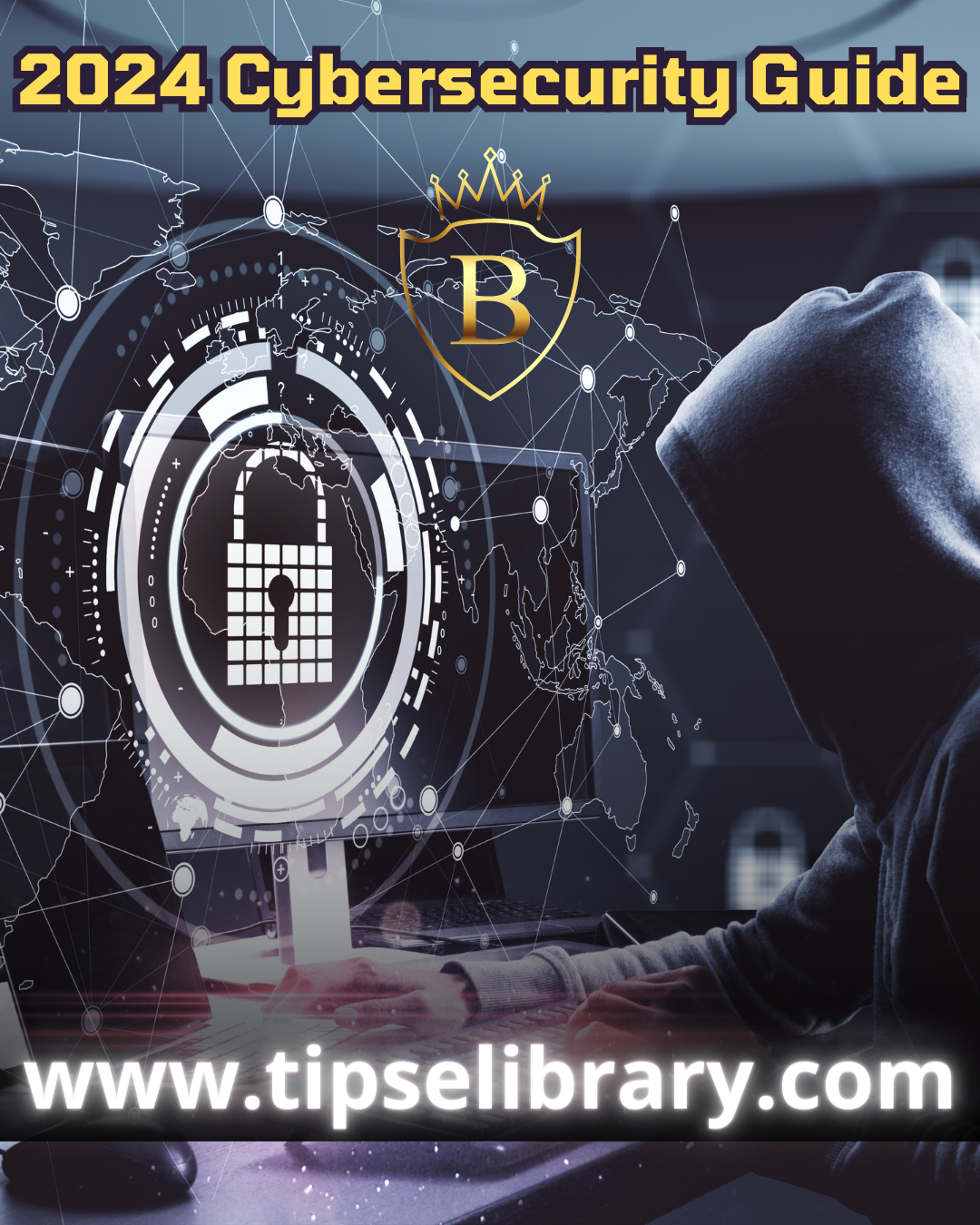Is Your Digital Life at Risk? The Shocking Truth About Cyber Threats in 2024
Picture this: You’re scrolling through your phone, sharing photos with friends, shopping online, or checking your bank balance. It feels safe, right? Think again. In 2024, your digital life is under constant threat, and you might not even realize it.
Did you know that your intimate photos could go viral without your consent? Or that hackers might be watching you through your own webcam right now? It’s not just celebrities and big corporations that are targets anymore – it’s you, your family, and everyone you know.
The internet has become a digital Wild West, where cyber outlaws are always looking for their next victim. But don’t panic just yet. We’re here to shed light on the dangers lurking in the shadows of the web and show you how to protect yourself in this brave new digital world.

The Evolving Landscape of Cybersecurity in 2024
Remember when the biggest online threat was a computer virus that made your screen go fuzzy? Those days are long gone. In 2024, the cyber threat landscape is like something out of a sci-fi nightmare – except it’s all too real.
Hackers aren’t just geeky kids in basements anymore. They’re organized, sophisticated, and sometimes even backed by entire governments. They’re using artificial intelligence to crack your passwords faster than you can say “123456” (which, by the way, is still one of the most common passwords!).
But it’s not just about stealing your credit card info anymore. Today’s cybercriminals are after something far more valuable: your entire digital identity. Imagine waking up one day to find out someone else is living your life online, posting as you on social media, accessing your bank accounts, and even talking to your friends and family. Scary, right?
And let’s talk about smart homes for a second. Sure, it’s cool to control your lights with your voice or have your fridge order milk when you’re running low. But did you ever stop to think about who else might be listening? In 2024, your smart home could be the biggest security risk you never saw coming.
Here’s a chilling thought: experts estimate that by the end of 2024, there will be a cyberattack every 11 seconds. That’s faster than you can microwave a bag of popcorn. And guess what? Small businesses and average Joes like you and me are increasingly in the crosshairs.
But why is this happening? Well, our lives have become more digital than ever. We’re storing more personal data online, doing more shopping from our phones, and sharing more of our lives on social media. For cybercriminals, it’s like we’re hanging our valuables out the window with a big neon sign saying, “Come and get it!”
And let’s not forget about the rise of cryptocurrency. While Bitcoin and its digital cousins have made some people rich overnight, they’ve also created a new playground for scammers and thieves. Imagine losing your life savings with just one click – because that’s exactly what’s happening to thousands of people every day.
The truth is, the internet of 2024 is a far cry from the friendly, open space it once was. It’s a place where your data is the new gold, and there are pirates around every corner trying to steal it. But don’t worry – knowledge is power, and we’re just getting started. In the next section, we’ll dive into the nitty-gritty of the most dangerous cyber threats you need to watch out for. Stay tuned, because what you learn might just save your digital life.
Major Cybersecurity Threats and Attack Trends
Buckle up, folks, because we’re about to take a wild ride through the dark alleys of the internet. Here are the cyber nasties keeping security experts up at night in 2024:
Ransomware on Steroids:
Remember when ransomware just locked your files? That’s child’s play now. Today’s ransomware doesn’t just encrypt your data – it threatens to leak your most sensitive information to the world if you don’t pay up. Imagine your private messages, financial records, or those embarrassing selfies you thought you deleted, all over the internet. And it’s not just individuals at risk – entire cities have been held hostage by these digital desperados.Deepfakes: The New Face of Fraud:
You’ve probably seen those videos where celebrities say bizarre things they never actually said. Well, in 2024, deepfake technology has gone mainstream. Scammers are using AI to create ultra-realistic video and audio of you, based on your social media posts. They can make you say or do anything – and use it to con your friends and family. Imagine your mom getting a video call from “you” asking for money in an emergency. Would she be able to tell it’s fake?Smart Home Invasions:
Your smart fridge might be plotting against you. Okay, not really, but hackers are turning smart homes into dumb security risks. They’re breaking into everything from baby monitors to thermostats. In 2024, we’ve seen cases of creeps spying through hacked security cameras, and even using smart home devices to figure out when you’re away so they can burglarize your house. Talk about uninvited guests!Phishing Gets Personal:
Gone are the days of obvious scam emails from Nigerian princes. Today’s phishing attacks are so sophisticated, even tech-savvy folks are falling for them. Hackers are using AI to craft personalized messages that look like they’re from your boss, your bank, or even your spouse. One click on the wrong link, and bam – they’ve got access to your entire digital life.Mobile Malware Madness:
Your smartphone is basically your life in your pocket, right? Well, hackers know that too. Mobile malware is exploding, with nasty little programs that can track your location, listen to your calls, and steal your data. And the scariest part? Many of these come disguised as legit apps in official app stores. That cute cat game you just downloaded? It might be secretly selling your data to the highest bidder.The Rise of AI-Powered Attacks:
It’s not just the good guys using AI. Hackers are unleashing artificial intelligence to create super-smart viruses that can adapt and evolve to dodge security measures. These AI-powered nasties can learn from each attempt to block them, becoming harder and harder to stop. It’s like trying to hit a target that keeps moving – and shooting back.Supply Chain Shenanigans:
This one’s sneaky. Instead of attacking you directly, hackers are going after the companies that make the software you use. They slip malicious code into legit software updates, turning trusted programs into Trojan horses. In 2024, we’ve seen major companies unknowingly distribute malware to millions of customers. It’s like finding out the locks on your doors were secretly designed by burglars.Crypto-jacking: The Silent Thief:
Fancy yourself a cryptocurrency millionaire? Watch out. Crypto-jackers are infecting devices with hidden programs that use your computer’s power to mine cryptocurrency for them. Your electric bill goes up, your device slows to a crawl, and someone else gets rich. It’s like someone sneaking into your house to use your electricity and internet, except you might never even know they’re there.The Internet of Vulnerable Things:
In 2024, everything’s connected to the internet – your car, your coffee maker, even your dog’s collar. But many of these devices have terrible security. Hackers are using these as back doors into your home network. That smart light bulb could be the weak link that lets criminals access your laptop or phone. It’s like leaving a window open in your house – except you didn’t even know the window existed.Social Media Weaponization:
Your innocent posts are being used against you. In 2024, hackers are using sophisticated algorithms to piece together information from your social media to create detailed profiles. They know when you’re on vacation, where your kids go to school, and what your passwords might be. It’s like giving a burglar a detailed map of your house and schedule.
The scariest part? These threats are evolving faster than many can keep up. But don’t panic – knowledge is the first step to protection. In our next section, we’ll look at how these threats are impacting real people and businesses. Because let’s face it, it’s not just about stolen data – it’s about stolen lives, ruined reputations, and shattered trust. Stay tuned, because what you learn might just save you from becoming the next cyber-victim.
Impact on Individuals and Businesses
You might be thinking, “Sure, this all sounds scary, but does it really affect me?” Spoiler alert: it does, and probably more than you realize. Let’s break down how these cyber threats are turning people’s lives upside down and costing businesses billions.
For Individuals:
Identity Theft Nightmares:
Imagine waking up to find out you’ve been denied a mortgage because someone trashed your credit score. Or getting arrested for a crime you didn’t commit because a hacker used your identity. In 2024, identity theft isn’t just about unauthorized credit card charges – it’s about having your entire life hijacked.Reputation Roulette:
Remember that party pic you thought was deleted? In the wrong hands, it could cost you your job or relationships. We’ve seen cases of people losing careers over hacked emails or manipulated social media posts. In the age of cancel culture, a strategically leaked (or faked) message can destroy lives in hours.Financial Fallout:
Cyber attacks hit where it hurts most – your wallet. From drained bank accounts to cryptocurrency scams, people are losing their life savings with a single click. And it’s not just the wealthy – everyday folks are increasingly targeted. That inheritance you were counting on? Gone in 60 seconds.Privacy? What Privacy?:
Your smart TV is watching you. Your fitness tracker knows when you sleep. Your phone knows where you go. In 2024, privacy feels like a luxury of the past. Hackers aren’t just stealing your data – they’re stealing your intimate moments and personal habits.Emotional Toll:
Being a victim of cybercrime isn’t just a financial hit – it’s emotionally devastating. Anxiety, depression, and trust issues are common among victims. Imagine feeling violated every time you open your laptop or suspecting every email is a scam. It’s digital PTSD, and it’s on the rise.
For Businesses:
Financial Hemorrhage:
Cyberattacks are bleeding businesses dry. In 2024, the average cost of a data breach has skyrocketed to millions. Small businesses are hit hardest – 60% close within six months of a cyber attack. It’s not just about lost money; it’s about lost futures.Reputation in Ruins:
In the age of viral news, a data breach can turn a trusted brand into a pariah overnight. Customer trust, built over years, can evaporate in hours. We’ve seen century-old companies crumble under the weight of cyber scandals.Operational Chaos:
Ransomware doesn’t just lock data – it paralyzes entire operations. Hospitals unable to access patient records, cities with frozen services, factories grinding to a halt – the ripple effects are enormous and sometimes life-threatening.Intellectual Property Theft:
In 2024, corporate espionage has gone digital. Companies are losing trade secrets, research data, and future product plans to cyber spies. It’s not just about current losses – it’s about stolen futures and evaporated competitive edges.Workforce Woes:
Cyber attacks don’t just affect systems – they affect people. Employees of breached companies face stress, job insecurity, and often become targets themselves. The talent drain after a major breach can be as damaging as the attack itself.Supply Chain Domino Effect:
In our interconnected world, one weak link can bring down an entire network. Companies are being held responsible for breaches that originated with vendors or partners. It’s guilt by digital association.
The Human Cost:
Behind every statistic is a real person. The small business owner who lost everything to a phishing scam. The teenager battling depression after intimate photos were leaked. The elderly couple scammed out of their retirement savings. The employee fired for a breach that wasn’t their fault.
In 2024, cybercrime isn’t just a tech problem – it’s a human crisis. It’s eroding the trust that holds our digital society together. Every time we hesitate before sharing a photo, think twice about an online purchase, or eye our smart devices with suspicion, the hackers win a little bit more.
But here’s the thing – it’s not all doom and gloom. Knowledge is power, and awareness is the first step to protection. In our next section, we’ll explore what you can do to shield yourself and your loved ones from these digital dangers. Because in this cyber war, every one of us is on the front lines.
Ready to learn how to fight back? Let’s move on to the solutions and best practices that can keep you safe in this digital Wild West.
General Solutions and Best Practices
Alright, digital warriors, it’s time to arm yourselves against the cyber baddies. Don’t worry – you don’t need a Ph.D. in computer science to protect yourself. Here are some down-to-earth tips that can make a world of difference:
Password Power-Up:
Look, we know “123456” is easy to remember, but it’s also easy to hack. In 2024, strong passwords are your first line of defense. Mix it up with uppercase, lowercase, numbers, and symbols. Better yet, use a passphrase – a string of random words is tougher to crack and easier to remember. And please, pretty please, use different passwords for different accounts. It’s like having a different key for every door in your house.Two-Factor Authentication (2FA) is Your New Friend:
Think of 2FA as the bouncer for your digital club. Even if someone steals your password, they still can’t get in without that second piece of ID – usually a code sent to your phone. Yes, it’s an extra step, but it’s like putting a deadbolt on your digital door. Use it everywhere you can, especially for email and financial accounts.Update, Update, Update:
We get it, those constant update notifications are annoying. But they’re like digital vaccines, protecting you against the latest viruses. Set your devices to update automatically if you can. It’s like having a team of security experts constantly reinforcing your digital fortress.Phishing? Not Today!
Remember, if it sounds too good to be true, it probably is. Be skeptical of unexpected emails, even if they look legit. Hover over links before clicking to see where they really go. And if an email asks you to log in to an account, go to the website directly instead of clicking the link. It’s like checking ID before letting a stranger into your home.Wi-Fi Wisdom:
Public Wi-Fi is convenient, but it’s also a hacker’s playground. Avoid accessing sensitive info (like your bank account) on public networks. If you must, use a VPN – it’s like an invisibility cloak for your data. And please, secure your home Wi-Fi with a strong password. You wouldn’t leave your front door wide open, would you?Social Media Savvy:
We love sharing, but oversharing can be dangerous. Be mindful of what you post – hackers can use that info to guess your passwords or answer security questions. And check your privacy settings regularly. It’s like being careful about what you say in public – some things are better kept private.Backup :
Imagine losing all your photos, documents, and data in an instant. Scary, right? Regular backups are your safety net. Use cloud storage or an external hard drive (or both!). It’s like having a spare key hidden outside – if you get locked out, you’re not totally stuck.App Awareness:
In 2024, not all apps play nice. Stick to official app stores, and even then, check reviews and permissions before downloading. An app that wants access to your contacts, location, and camera just to tell you the weather? That’s a red flag. It’s like checking the ingredients list before eating – know what you’re putting into your digital body.Educate and Communicate:
Cyber safety is a family affair. Talk to your kids, parents, and grandparents about online dangers. Remember, your cyber defenses are only as strong as your weakest link. It’s like teaching your family to lock the doors – everyone needs to be on board.Antivirus: Your Digital Immune System:
In 2024, a good antivirus is more than just virus protection – it’s a comprehensive security suite. It can catch malware, block phishing attempts, and even protect your webcam from spies. Think of it as your digital bodyguard, working 24/7 to keep you safe.Credit Monitoring: Your Financial Watch Dog:
With identity theft on the rise, keeping an eye on your credit report is crucial. Many services offer real-time alerts for any suspicious activity. It’s like having a security camera on your financial house.The Human Firewall:
Here’s the kicker – the best security tool is between your ears. Stay informed about the latest scams and threats. Trust your gut – if something feels off, it probably is. It’s like developing a sixth sense for danger in the digital world.Encryption is Your Friend:
When possible, use encrypted messaging apps and email services. It’s like using a secret code to communicate – even if someone intercepts your message, they can’t read it.Smart Home, Smart Security:
If you’re turning your home into a smart home, make sure it’s a secure one. Change default passwords on all devices, keep them updated, and consider segmenting your home network. It’s like making sure every smart device has its own set of locks.The Nuclear Option: Data Minimization:
Sometimes, the best defense is not having the data in the first place. Regularly delete old accounts, clear out your email, and think twice before giving out personal information. The less data you have out there, the less there is to steal.
Remember, cybersecurity isn’t about paranoia – it’s about smart, proactive protection. You lock your doors at night, right? Think of these practices as locking your digital doors. It might seem like a lot, but once you make them habits, they’ll become second nature.
In our next section, we’ll dive deeper into the role of antivirus software in modern cybersecurity. Because in 2024, your antivirus isn’t just fighting viruses – it’s your all-in-one digital guardian. Ready to meet your new cyber bodyguard? Let’s go!
The Role of Antivirus Software in Modern Cybersecurity
Remember when antivirus software was just about catching computer viruses? Well, in 2024, it’s evolved into something much more powerful. Think of modern antivirus as less like a security guard and more like an entire Security Team for your digital life.
Why You Need More Than Just a “Virus Scanner”:
The Threat Landscape Has Exploded:
Viruses are so 1990s. Today, we’re dealing with ransomware, spyware, cryptojackers, and a whole zoo of other digital nasties. Modern antivirus software is designed to tackle this entire spectrum of threats.Real-Time Protection is Crucial:
In the fast-paced world of 2024, waiting for a scheduled scan isn’t enough. Modern antivirus works 24/7, constantly monitoring for suspicious activity. It’s like having a security camera that not only records intruders but stops them in their tracks.Cyber Threats Are Getting Smarter:
With AI-powered malware on the rise, we need equally smart defenses. Advanced antivirus solutions use machine learning and behavioral analysis to spot even unknown threats. It’s like having a psychic bouncer who can predict trouble before it happens.
What Modern Antivirus Software Really Does:
Malware Detection and Removal:
This is the bread and butter. But it’s not just about catching known viruses anymore. Modern solutions use heuristic analysis to identify potential threats based on behavior, not just signatures.Firewall Protection:
Many antivirus suites include a firewall, acting as a gatekeeper for your internet connection. It monitors incoming and outgoing traffic, blocking suspicious activities. Think of it as a bouncer for your data.Web Protection:
Dangerous websites? Phishing attempts? Good antivirus will warn you before you stumble into a digital trap. It’s like having a friend who pulls you back from walking into a sketchy alley.Email Scanning:
With phishing being a top threat, email protection is crucial. Antivirus software scans attachments and links in real-time, keeping your inbox from becoming a Trojan horse.Ransomware Protection:
Specific features to prevent your files from being encrypted and held hostage. Some even keep secure backups of your important files, just in case.Privacy Protection:
Features like webcam protection, keystroke encryption, and secure browsing modes keep your personal data from prying eyes. It’s like having digital curtains for your online life.Performance Optimization:
Many modern antivirus solutions include tools to keep your device running smoothly, removing junk files and optimizing settings.Parental Controls:
For families, these features help keep kids safe online, monitoring activity and blocking inappropriate content.Password Managers:
Some antivirus suites include secure password managers, helping you use strong, unique passwords for every account without having to remember them all.VPN Services:
Virtual Private Networks are becoming a common feature, encrypting your internet connection for added privacy and security.
Choosing the Right Antivirus in 2024:
With so many options out there, how do you choose? Here are some factors to consider:
Comprehensive Protection:
Look for solutions that offer a full security suite, not just virus protection.Low System Impact:
Good antivirus shouldn’t slow your device to a crawl. Look for lightweight options that run efficiently.User-Friendly Interface:
You shouldn’t need a computer science degree to use it. The best solutions are powerful yet easy to navigate.Regular Updates:
The cyber threat landscape changes daily. Your antivirus should update frequently to keep up.Cross-Platform Support:
In 2024, we use multiple devices. Look for solutions that can protect your computer, smartphone, and tablet.Additional Features:
Consider what extra tools might be useful for you – like a password manager or VPN.Customer Support:
When things go wrong, you want reliable help. Look for companies with strong customer support.Independent Test Results:
Check how the antivirus performs in independent lab tests. These give an unbiased view of its effectiveness.
The Bottom Line:
In 2024, good antivirus software is not just a nice-to-have – it’s a must-have. It’s your first and often last line of defense against the myriad of cyber threats out there. But remember, even the best antivirus can’t protect you from everything. It’s a powerful tool, but it works best when combined with smart online habits and a healthy dose of digital skepticism.
As we wrap up, it’s worth noting that while there are many great options out there, one name that consistently comes up in discussions of top-tier antivirus solutions is Bitdefender. Known for its comprehensive protection, low system impact, and cutting-edge features, Bitdefender has received numerous awards and high marks from independent testers. But don’t just take our word for it – do your research and find the solution that best fits your needs.
In our final section, we’ll recap the key points and offer some closing thoughts on staying safe in our increasingly digital world. Ready to become a cyber-safety pro? Let’s wrap this up!
Conclusion
As we close, let’s shift our perspective. Instead of seeing cybersecurity as a burden, view it as an enabler. Good security practices don’t just protect you from bad things – they empower you to fully embrace the amazing possibilities of our digital age. They give you the confidence to explore, create, connect, and innovate without fear.
In 2024 and beyond, digital literacy and cybersecurity awareness are not just technical skills – they’re essential life skills. By taking charge of your digital security, you’re taking charge of your future.
So go forth, digital citizens! Explore, connect, create, and enjoy all that our amazing digital world has to offer. Just remember to lock your digital doors, watch out for cyber potholes, and keep your virtual seatbelt fastened. The internet is a wild and wonderful place – stay safe out there!
Special Offer for TipsElibrary.com Readers
Now that you’re armed with knowledge about cybersecurity in 2024, it’s time to take action. And we’ve got an exclusive offer to help you get started!
Bitdefender: Your Digital Guardian in 2024 and Beyond
As we’ve discussed, a robust antivirus solution is crucial in today’s cyber landscape. And when it comes to comprehensive protection, Bitdefender stands out as a true leader in the field.
Why Bitdefender?
Award-Winning Protection: Bitdefender consistently ranks at the top in independent tests, earning numerous awards for its superior malware detection and removal capabilities.
Cutting-Edge Technology: With advanced AI and machine learning, Bitdefender stays ahead of emerging threats, providing real-time protection against even unknown malware.
Minimal System Impact: Despite its powerful features, Bitdefender is designed to run smoothly without slowing down your devices.
Comprehensive Suite of Tools: From ransomware protection to secure VPN, Bitdefender offers a full array of cybersecurity features to keep you safe in every aspect of your digital life.
User-Friendly Interface: Powerful protection doesn’t have to be complicated. Bitdefender’s intuitive design makes top-tier security accessible to everyone.
Exclusive TipsElibrary.com Reader Offer:
We’re excited to offer our readers an exclusive discount on Bitdefender’s top-rated security solutions:
50% off on Bitdefender Antivirus Plus, Total Security, and Internet Security
These comprehensive packages provide robust protection for all your devices, safeguarding you against the full spectrum of cyber threats we’ve discussed.50% off on Bitdefender Digital Identity Protection
In an age where identity theft is a growing concern, this specialized solution monitors your personal data, alerting you to potential breaches and helping you take control of your online presence.
More from Tipelibrary
How to Create a WooCommerce Website: Complete Guide for 2024
- August 14, 2024
- 9 Minutes
Nvidia RTX 4080 Super and AMD Ryzen 7 8700G: Evolution...
- February 27, 2024
- 3 Minutes
Microsoft Project 2021 Professional vs Standard: What’s the Difference?
- October 18, 2024
- 5 Minutes
Digital Identity Protection: Safeguard Your Personal Data in 2025 |...
- February 3, 2025
- 3 Minutes
9 Essential iPhone Apps for 2024: Revolutionize Your Everyday Life
- February 29, 2024
- 3 Minutes








